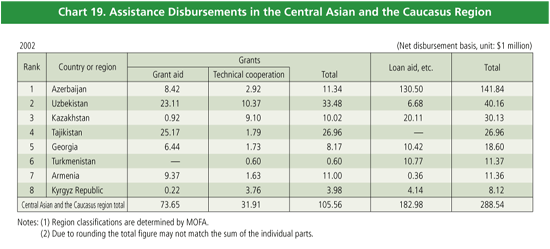

| Part III. | ODA DISBURSEMENTS IN FISCAL YEAR 2002 |
Japan’s bilateral ODA to the Central Asian and the Caucasus
region in 2002 was approximately $290 million, 4.3% of total bilateral ODA.
Japan has been carrying out assistance in the Central Asian and the Caucasus
region placing importance on the following points, as stated in the medium-term
policy.
| (1) | Japan will provide support for social and economic infrastructure development to help build the foundation for self-reliant economic development. |
| (2) | Japan will provide assistance for human resources development and institution building to support the process of democratization and transition to market economies. |
| (3) | Japan will provide support for the alleviation of social problems and difficulties encountered in the process of reform and for the transition from the negative legacy of the Soviet period (e.g. support for environmental pollution countermeasures and for radiation victims of Semipalatinsk). |
Japan is supporting the efforts of the countries of the Central
Asian and the Caucasus region, in a new international situation since the collapse
of the former Soviet Union, to introduce market economies and, taking into consideration
the role that the region can play with the changes in the international environment
since the September 11 terrorist attacks in the US, is actively supporting the
socio-economic development of these countries. Specifically Japan is providing
assistance focused on technical cooperation for human resources development
and financial cooperation for the alleviation of difficulties encountered in
the process of economic reform.
The countries of the Central Asian and the Caucasus region are countries currently
in transition from state-planned economies to market economies and because “soft”
cooperation is important, Japan is providing support for human resources development
and institution building. By the end of fiscal year 2002 Japan had accepted
2,625 trainees from these eight countries. And Japan is supporting human resources
development and institution building in the region through the dispatch of experts
in the economic management, legal systems development support, communications,
finance, environment, transportation infrastructure, and health and medical
services sectors, etc. and development studies in the social sector, energy,
and natural resources development sector.
For example, because the institutional reform and human resources development
in the health and medical services sector are urgent issues in Uzbekistan, in
fiscal year 2002 Japan commenced a development survey entitled “The Study
on the Restructuring of Health and Medical Systems in the Republic of Uzbekistan”
and decided on the implementation of the “Project for Improvement of Nursing
Education System,” which provides basic equipment for nursing education
through grant aid. Japan is also continuously dispatching health and medical
services sector experts to Uzbekistan and providing effective support through
organic coordination of technical cooperation and grant aid.
In addition, Japan opened “Human Resources Cooperation Centers (Japan Centers)”
as bases for human resources development support in Uzbekistan, Kazakhstan and
the Kyrgyz Republic, and is contributing to human resources development in this
region through the dispatch of experts from Japan to the centers and by holding
business courses on economic management, etc. and Japanese language courses,
etc. in the centers.
Because there are some countries in this region with marked domestic regional
disparities, Japan is carrying out assistance focused on reducing regional disparities,
in particular through the provision of health and medical services, etc. For
example, Japan is implementing the “The Project for Improvement of Medical
Equipment to Multi-Field Hospital Complex of Kzylorda” that provides medical
equipment used in basic diagnostic activities to Kazakhstan through grant aid.
The Kyrgyz Republic is working to improve health indicators for maternal and
child health and to reduce regional disparities by building new medical service
institutions, and in order to support these efforts by the Kyrgyz Republic,
Japan is implementing the “The Project for Improvement of Medical Equipment
for Obstetric and Gynecologic Hospitals” to provide the medical equipment,
etc. necessary to improve the standard of maternal and child health and medical
services through grant aid in three provinces and the capital Bishkek. In this
way, Japan is providing medical equipment through grant aid to regions with
relatively large poor populations and relatively poor access to basic medical
services compared to other regions in the country, with the objective of improving
the standard of medical services in those regions.
The characteristic feature of support for the Central Asian and the Caucasus
Region is the active utilization of grassroots human security grant aid and
most of this is allocated to the education sector or the medical services and
health sector. Japan believes that these kinds of assistance will continue to
play an important role in this region as finely-tuned assistance, fast assistance,
and assistance that directly contributes to the future reduction of regional
disparities.
 |